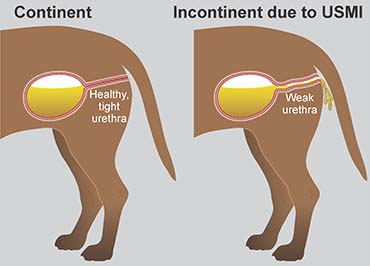USMI in dogs
Overview
- Does your dog leak urine? Especially when they are lying down? They could be suffering from USMI - a common cause of urinary incontinence in dogs.
- USMI is when the urethra (the tube that carries urine out of the body) becomes weak, and leaky.
- Fortunately, treatment for USMI is often very successful.
- USMI can affect any dog, but it’s especially common in large breed, older, neutered, female dogs.
- Contact your vet if your dog is leaking urine.
What is USMI?
The urethra is the tube that carries urine out of the body when your dog pees, the rest of the time it stays closed and stops urine from escaping. USMI (Urethral Sphincter Mechanism Incompetence) is when the muscles inside your dog’s urethra become weak and unable to stop urine escaping (see diagram below). It’s often difficult to pinpoint the cause of USMI but there are several factors that can make it more likely, including:
- Being female
- Being a large breed dog (over 20kg)
- Being overweight
- Getting older
- Having a docked tail
- Being neutered at a very young age (before 3 months old)
- Having a bladder that sits far back in the abdomen
- Having a short urethra.

USMI is when the muscles inside your dog’s urethra become weak. Click image to enlarge.
Symptoms
- Urine dribbling, especially when lying down or sleeping
- Urine staining around their vulva/penis
- Urine infections
- Peeing normally the rest of the time.
Treatment
Treatment for USMI is often simple and successful with medication to tighten the urethra. Your dog’s medication will come as a liquid or a tablet and needs to be given daily for the rest of their life. If you stop giving your dog their medication, their symptoms will return. Don’t be disheartened if your dog’s medication doesn’t work straight away, let your vet know so that they can make some adjustments.
Outlook and ongoing care
In most cases, treatment is very successful. It’s likely that with time, your vet will increase your dog’s medication dose to keep them continent.
Monitoring
Once your dog has started medication, it’s important to keep an eye on their peeing habits; make a note of any leaking and tell your vet if any new symptoms develop.
Urine infections
Dog’s with USMI have an increased risk of developing urine infections. Monitor forsymptoms such as pain, blood and frequent peeing. Even if everything seems fine, your vet may want to check your dog’s urine every now and again.
 Video found at youtu.be/U3WIXBEXB8o
Video found at youtu.be/U3WIXBEXB8o
Does speying increase the risk of USMI?
Some people believe that USMI is more common in dogs that have been neutered at a young age/before their first season. However, there is no solid evidence to prove this and it’s important to consider that there are definite risks associated with leaving a dog unneutered until after their first season e.g. mammary tumours and unwanted pregnancies. Speak to your vet for more advice about the right time to neuter your dog.
Cost
Treatment for a condition such as USMI can become expensive over time. It’s important to speak openly to your vet about your finances, the cost of treatment, as well as what you think is right for your dog. There are often several treatment options so if one doesn’t work for you and your pet then your vet may be able to offer another.
When you welcome a new dog into your life, consider getting dog insurance straight away before any signs of illness start. This will give you peace of mind that you have some financial support if they ever get sick.
Published: September 2019
Did you find this page useful?
Tell us more
Please note, our vets and nurses are unable to respond to questions via this form. If you are concerned about your pet’s health, please contact your vet directly.
Thank you for your feedback
Want to hear more about PDSA and get pet care tips from our vet experts?
Sign up to our e-newsletter
Written by vets and vet nurses. This advice is for UK pets only. Illustrations by Samantha Elmhurst.

 Video found at youtu.be/A4v4f1_s-xQ
Video found at youtu.be/A4v4f1_s-xQ
